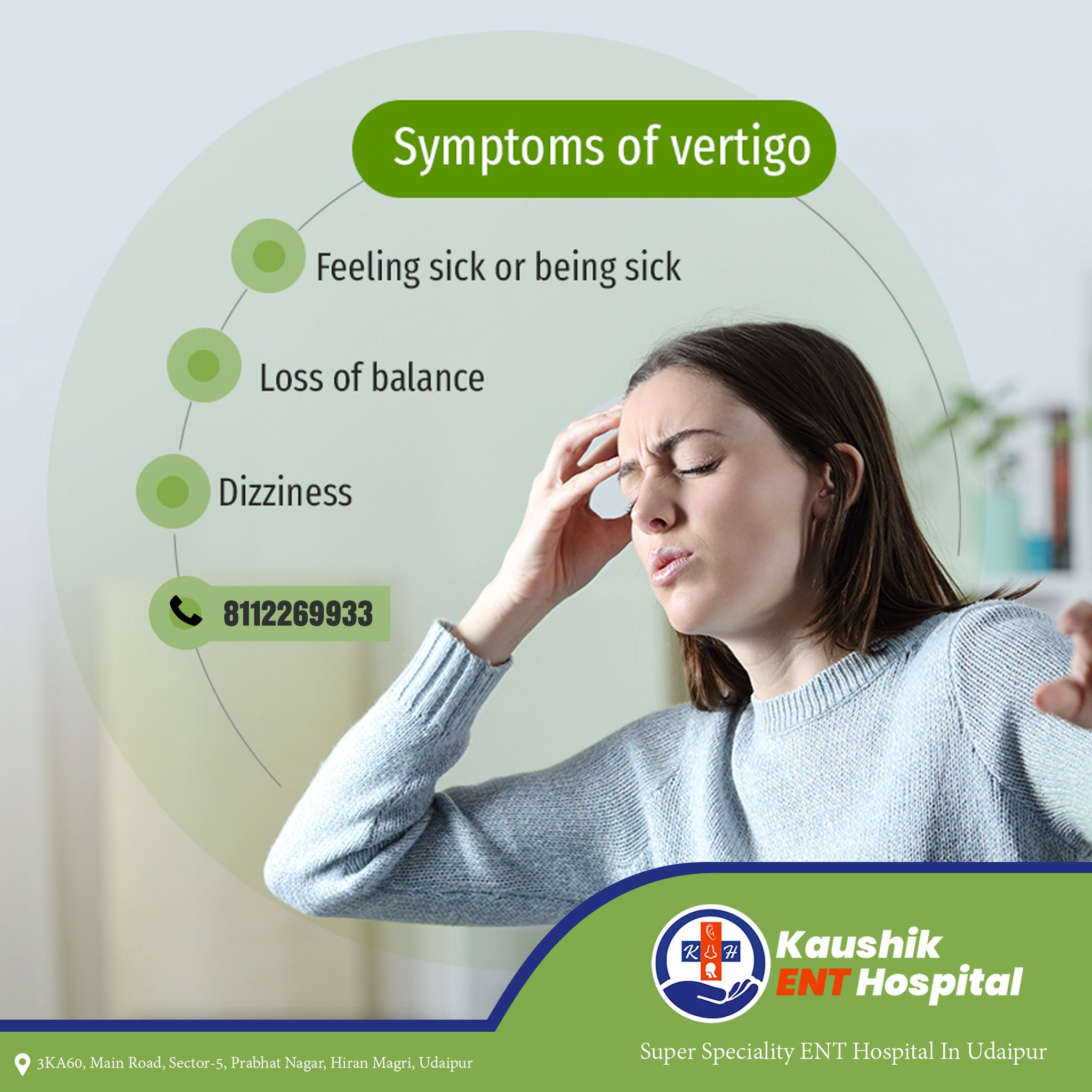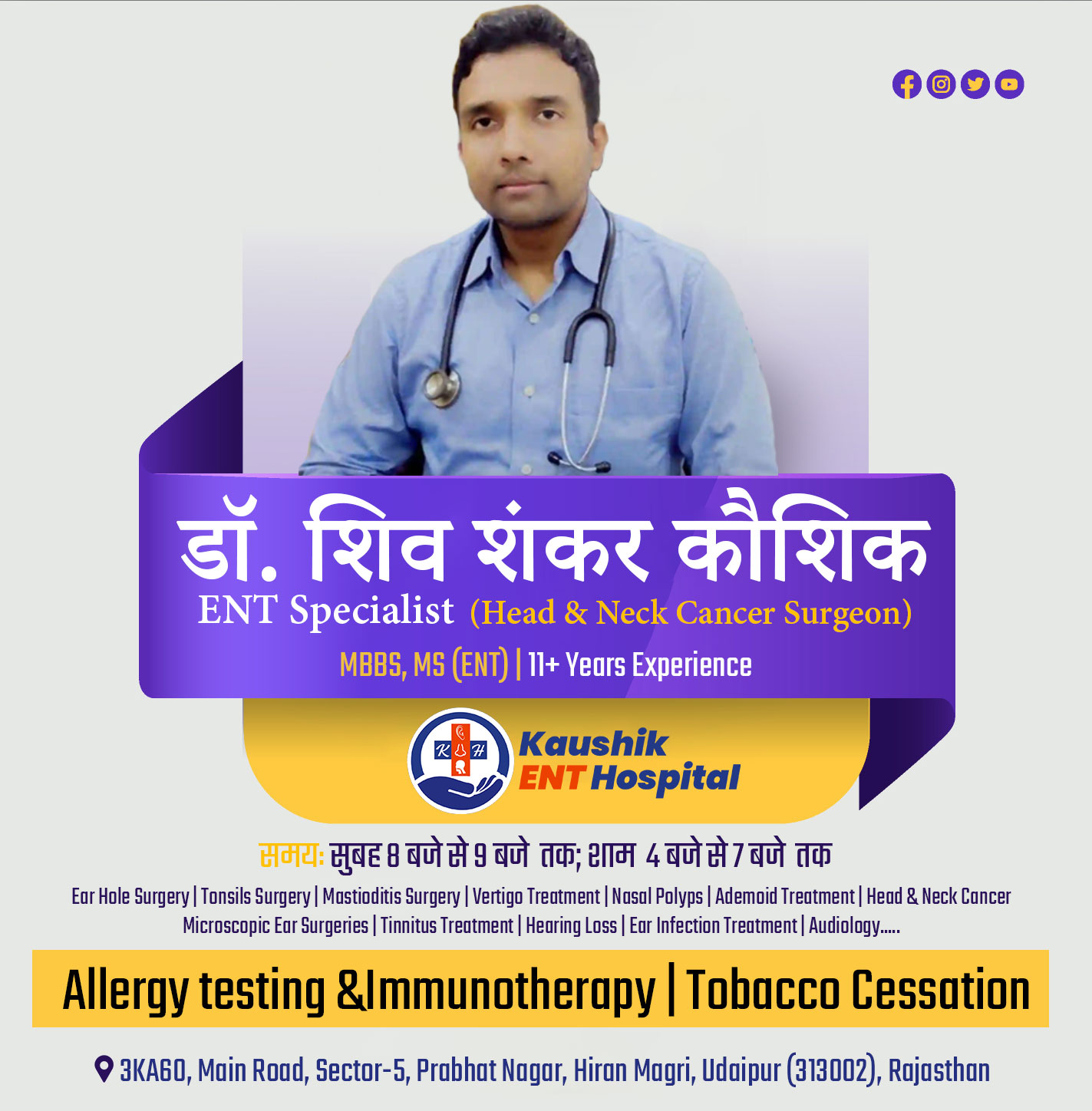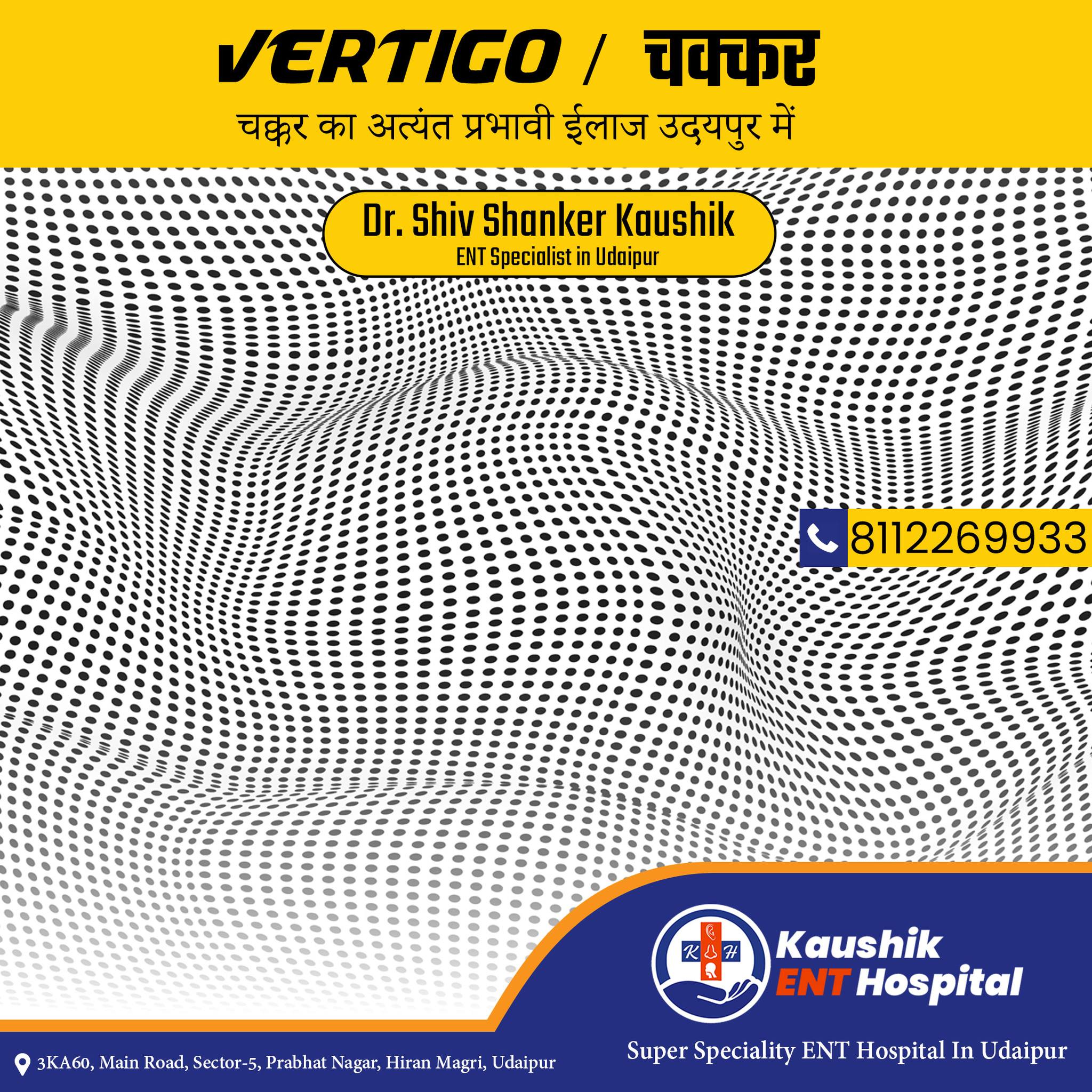Kaushik ENT Hospital is offering the best Vertigo Treatment in Udaipur. Our ENT Specialist D.r Shiv Shanker Kaushik hundreds of Vertigo cases every year and he has strong hold to handle this problem. Even Udaipur’s major Neurologists recommend Dr. Shiv Shanker Kaushik for Vertigo Treatment and refer them to Kaushik ENT hospital. So if you are looking for best Vertigo Treatment in Udaipur, visit Kaushik ENT Hospital & Consult with Dr. Shiv Shanker kaushik.
What is Vertigo?
Vertigo is a symptom, rather than a condition itself. It’s the sensation that you, or the environment around you, is moving or spinning.
This feeling may be barely noticeable, or it may be so severe that you find it difficult to keep your balance and do everyday tasks.
Other symptoms associated with vertigo may include:
- loss of balance – which can make it difficult to stand or walk
- feeling sick or being sick
- dizziness

What causes vertigo?
Vertigo is commonly caused by a problem with the way balance works in the inner ear, although it can also be caused by problems in certain parts of the brain.
Causes of vertigo may include:
- benign paroxysmal positional vertigo (BPPV) – where certain head movements trigger vertigo
- migraines – severe headaches
- labyrinthitis – an inner ear infection
- vestibular neuronitis – inflammation of the vestibular nerve, which runs into the inner ear and sends messages to the brain that help to control balance
Depending on the condition causing vertigo, you may experience additional symptoms, such as a high temperature, ringing in your ears (tinnitus) and hearing loss.
Types of Vertigo
Vertigo is a symptom of several different conditions. There are two types of vertigo, known as peripheral and central, depending on the cause.
1. Peripheral Vertigo
Peripheral vertigo is the most common type, often caused by a problem with the balance mechanisms of the inner ear. The most common causes include:
- benign paroxysmal positional vertigo (BPPV)
- head injury
- labyrinthitis
- vestibular neuronitis
- Meniere’s disease
- taking certain types of medication
2. Central Vertigo
Central vertigo is a clinical condition in which an individual experiences hallucinations of motion of their surroundings, or a sensation of spinning, while remaining still, as a result of dysfunction of the vestibular structures in the central nervous system (CNS). The patient complains typically of dizziness with hallucination or sense of spinning. This is different from the light-headed “dizziness” which is more commonly secondary to global impairment of cerebral perfusion.
Central vertigo occurs when there is any lesion or dysfunction of the brainstem vestibular apparatus as described above. Peripheral vertigo may occur as a result of problems in the peripheral vestibular system from the inner ear to the vestibular division of the VIIIth cranial nerve. Peripheral vertigo accounts for over 90% of all causes of vertigo. Central vertigo most commonly occurs as a result of ischemia of the central vestibular structures in the cerebellum, brainstem, or vestibular nuclei especially in the elderly with vascular risk factors. Acute demyelination such as multiple sclerosis is another relatively common cause of central vertigo in younger patients. The other not so uncommon cause is medication-induced, especially toxicity due to common anticonvulsants such as phenytoin, phenobarbital, and carbamazepine. Other less common causes include infection, trauma, posterior fossa brain tumors, and migraine.
Causes of central vertigo include:
- Migraines – a severe headache that’s usually felt as a throbbing pain at the front or on one side of your head, which is especially common in younger people
- Multiple Sclerosis – a condition that affects the central nervous system (the brain and spinal cord)
- Acoustic Neuroma – a rare, non-cancerous (benign) brain tumour that grows on the acoustic nerve, which is the nerve that helps to control hearing and balance
- A brain tumour in the cerebellum, located at the bottom of the brain
- A transient ischaemic attack (TIA) or a stroke – where part of the blood supply to the brain is cut off
- taking certain types of medication

Causes of Peripheral Vertigo explained in details:
Benign paroxysmal positional vertigo (BPPV)
This is one of the most common causes of vertigo. It can occur during specific head movements, while standing up or bending over, crossing the road, or turning in bed.
BPPV involves short, intense, recurrent attacks of vertigo (usually lasting a few seconds to a few minutes). It is often accompanied by nausea, although vomiting is rare. You may also experience your eyes briefly moving uncontrollably (nystagmus).
Lightheadedness and a loss of balance can last for several minutes or hours after the attack.
BPPV is thought to be caused by small fragments of debris (calcium carbonate crystals), which break off from the lining of the channels in your inner ear. The fragments don’t usually cause a problem, unless they get into one of the ear’s fluid-filled canals.
When your head is still, the fragments sit at the bottom of the canal. However, certain head movements cause them to be swept along the fluid-filled canal, which sends confusing messages to your brain, causing vertigo.
BPPV usually affects older people, with most cases occurring in people older than 50 years of age.
BPPV may occur for no apparent reason, or it may develop after:
- an ear infection
- ear surgery
- a head injury
- prolonged bed rest – for example, while recovering from an illness
Head injury
Vertigo can sometimes develop after a head injury. If you have symptoms of dizziness or vertigo following a head injury, seek medical attention.
Labyrinthitis
Labyrinthitis is an inner ear infection that causes a structure deep inside your ear (the labyrinth) to become inflamed. The labyrinth is a maze of fluid-filled channels that control hearing and balance.
When the labyrinth becomes inflamed, the information it sends to your brain is different from the information sent from your unaffected ear and your eyes. These conflicting signals cause vertigo and dizziness.
Labyrinthitis is usually caused by a viral infection, such as the common cold or flu, which spreads to the labyrinth. Less commonly, it’s caused by a bacterial infection.
Vertigo caused by labyrinthitis may be accompanied by nausea, vomiting, hearing loss, tinnitus and sometimes a high temperature and ear pain.
Vestibular neuronitis
Vestibular neuronitis, also known as vestibular neuritis, is an inner ear condition that causes inflammation of the nerve connecting the labyrinth to the brain. In some cases, the labyrinth itself can also be inflamed.
The condition is usually caused by a viral infection. It usually comes on suddenly and can cause other symptoms, such as unsteadiness, nausea (feeling sick) and vomiting (being sick). You won’t normally have any hearing problems.
It usually lasts a few hours or days, but it may take three to six weeks to settle completely.
Ménière’s disease
Severe vertigo is sometimes caused by a rare condition that affects the inner ear, called Ménière’s disease. This can cause vertigo, as well as hearing loss, tinnitus and aural fullness (a feeling of pressure in your ear).
If you have Ménière’s disease, you may experience sudden attacks of vertigo that last for hours or days. The attacks often cause nausea and vomiting.
The cause is unknown, but symptoms can be controlled by diet and medication. Rarely, you may need further treatment in the form of surgery.
Medication
Vertigo may occur as a side effect of some types of medication. Check the patient information leaflet that comes with your medicine to see if vertigo is listed as a possible side effect.
Don’t stop taking prescribed medication without your doctor’s advice, but speak to your ENT specialist if you’re worried about the side effects. They may be able to prescribe an alternative medication.




Leave A Comment